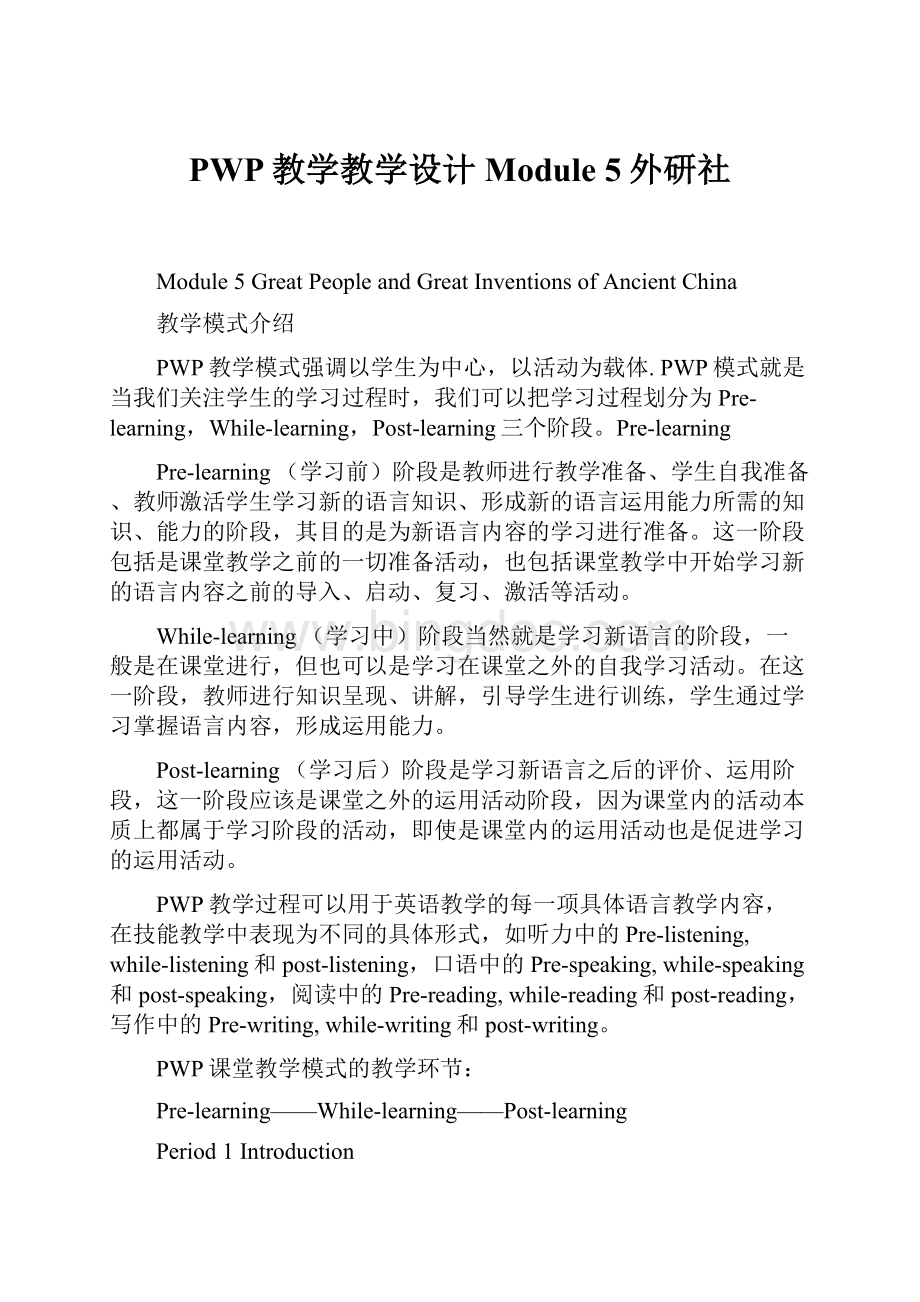PWP教学教学设计Module 5外研社.docx
《PWP教学教学设计Module 5外研社.docx》由会员分享,可在线阅读,更多相关《PWP教学教学设计Module 5外研社.docx(30页珍藏版)》请在冰点文库上搜索。

PWP教学教学设计Module5外研社
Module5GreatPeopleandGreatInventionsofAncientChina
教学模式介绍
PWP教学模式强调以学生为中心,以活动为载体.PWP模式就是当我们关注学生的学习过程时,我们可以把学习过程划分为Pre-learning,While-learning,Post-learning三个阶段。
Pre-learning
Pre-learning(学习前)阶段是教师进行教学准备、学生自我准备、教师激活学生学习新的语言知识、形成新的语言运用能力所需的知识、能力的阶段,其目的是为新语言内容的学习进行准备。
这一阶段包括是课堂教学之前的一切准备活动,也包括课堂教学中开始学习新的语言内容之前的导入、启动、复习、激活等活动。
While-learning(学习中)阶段当然就是学习新语言的阶段,一般是在课堂进行,但也可以是学习在课堂之外的自我学习活动。
在这一阶段,教师进行知识呈现、讲解,引导学生进行训练,学生通过学习掌握语言内容,形成运用能力。
Post-learning(学习后)阶段是学习新语言之后的评价、运用阶段,这一阶段应该是课堂之外的运用活动阶段,因为课堂内的活动本质上都属于学习阶段的活动,即使是课堂内的运用活动也是促进学习的运用活动。
PWP教学过程可以用于英语教学的每一项具体语言教学内容,在技能教学中表现为不同的具体形式,如听力中的Pre-listening,while-listening和post-listening,口语中的Pre-speaking,while-speaking和post-speaking,阅读中的Pre-reading,while-reading和post-reading,写作中的Pre-writing,while-writing和post-writing。
PWP课堂教学模式的教学环节:
Pre-learning——While-learning——Post-learning
Period1Introduction
设计思路说明
【Pre-learning】
Showingthepicturesofancientphilosophersandletthestudentsguesswhotheyare.Ifnecessary,givethestudentssomeinformationaboutthesefamouspeople.
【While-learning】
Learnthevocabularyandcompletethepassageaboutthethreephilosophers,andknowtheirteachingthoughts.
【Post-learning】
Leadstudentstoexpressagreementsanddisagreements,andgivereasons.
教材分析
本单元为话题,旨在通过单元教学使学生通过讨论中国古代哲学,及古代哲学思想,如何发表自己的观点并给出原因等问题,使学生树立正确的哲学观。
并针对这些思想,指导学生发表自己的见解和看法,通过进一步讨论掌握发表同意或不同意的句子,及给出理由的句子。
并能就哲学家及哲学思想进行评论,对相关哲学思想写出观点明确、论证有力的短文。
INTRODUCTION提前布置准备关于哲学与哲学家的信息,课上找同学讲解,从而激发学生对本单元的中心话题产生兴趣;同时也使教师对本单元的授课更具有针对性,从而有效地帮助学生树立正确的哲学观念。
教学目标
【知识与能力目标】
EnableSstotalkaboutphilosophersandphilosophies.
EnableSstolearnhowtoexpressagreements/disagreements,toknowhowtogivereasons
【过程与方法目标】
Completethepassageaboutthethreephilosophers,andknowtheirteachingthoughts.
【情感态度价值观目标】
Tohelpstudentsbuildcorrectphilosophyvalues.
教学重难点
【教学重点】
Talkaboutagreementsanddisagreements.
Givereasons:
Whatwouldyousaywhenyouwanttogivereasons?
【教学难点】
Expressagreementsanddisagreements.
Discussthesentencesthatgivereasons.
课前准备
Arecorder,acomputer,andaprojector
教学过程
StepI.Pre-learning
Leadingin
Showingthepicturesofancientphilosophersandletthestudentsguesswhotheyare.Ifnecessary,givethestudentssomeinformationaboutthesefamouspeople.
T:
Doyouknowwhotheyare?
S1:
IsthefirstoneConfucius?
S2:
Yes,heisConfucius.
S3:
ThesecondoneisMencius.
S4:
ThelastoneisMozi.
S5:
IknowConfuciusthoughtkindnesswasimportant.
S6:
You’reright!
AndIknowMozihatedtheideaofwars.
T:
Verygood!
Youhavesaidmuchaboutthephilosophers.Youdidanexcellentjob.Inthismodule,wewilllearnmoreaboutthesephilosophersandtheirphilosophies.Nowlet’slookattheIntroduction.
StepII.While-learning
1.Asksomestudentstoreadoutthewordsandsaytheirmeaningswhileothersarelistening.
2.Readtheinstruction,andletthemknowwhattodo.
Thengivethemtwominutestoreadandfillinthepassage.
Thenasksomeonetoreadthepassagetochecktheanswers.
3.AskwhatelsetheyknowaboutConfucius,MenciusandMozi.
Theyshouldsaythreethingstheyknowaboutthem.Iftheylike,theycanworktogetherwiththeirpartners.Thenaskthemtosaysomethingaboutthefamouspeople.
S1:
IknowConfuciuswasborninLuguo,whichisinShandongprovinceandiscalledQufunow.
S2:
Yes,theplacenowiscalledQufu.IknowQufuisafamousplacebecauseofhim.
S3:
Hehadmanystudents,butonlyseventy-twoofthemwerefamous.
S4:
Confuciuswrotemanygreatbooksandsaidmanygreatwords,sohewasconsideredtobeoneofthegreatestpersonsinthehistoryofChina.
T:
Terrific.Confuciusisreallygreatforhisthoughts.Butthereweremanyotherphilosophers.Whocansaysomethingaboutthem?
S5:
MenciuswasborninaplacecalledZhouguo.
S6:
AndhisteachingwassimilartothatofConfucius.
S7:
Yes,healsowrotemanybooks,oneofwhichwasnamedMencius.
S8:
IknowsomethingaboutMozi,hewasborninTengguo,andhisfamilywasverypoor.
S9:
Yes,thereisastatueofhiminhishometown.Hethoughtthatstrongpeopleshouldlookafterweakerpeople.
S10:
Hewasalsothoughttobeagreatphilosopher,becausehewroteafamousbookcalledMozi.
T:
Good!
Thesearesomethingaboutthephilosophers,butdoyouknowtheirteachings?
4ReadtheinstructionofActivity2,andthenaskthemtodiscussitwiththeirpartners.
Thenchooseonestudenttotellhisanswer.Theteachercancorrecttheanswer.
StepIII.Post-learning
1.Expressagreementsanddisagreements.
T:
Iverymuchagreewithstatement4.Ifyouwantotherpeopletobekindtoyou,youmustbekindtothem.Whataboutyou?
Whichstatementdoyouagreeordisagree?
Pleaseexplainyourreasonsinoneortwosentences.Anyvolunteer?
S1:
Istronglyagreewithstatement1.Ithinkitisright.Whenamanisborn,heisgood.Ashegrowsolder,thepeopleandtheenvironmentaroundhimmayaffecthim.
S2:
Ithinkstatement5isright.Ifarulerwantstocontinuehisrule,heshouldbekindtohispeople.
S3:
Idisagreewithstatement6.Weshouldbekindtomostpeople,notincludingthebadpeople.
S4:
IagreewithS3.Ialsothinkbadpeopleshouldn’tbetreatedwell.
S5:
Idon’tthinkstatement2isright.Infact,peoplearenotequal.Forexample,fatherandsoncannotbeequal.
T:
Well,boysandgirls.Itdoesn’tmatterwhetheryouagreeordisagreewiththesestatements.Youhavepracticedgivingyouragreementsordisagreements,right?
Thatiswhatyoushouldpayattentionto.
2.Function−Givingreasons
(1)LookatActivity1.Letthemlearnhowtogivereasons.
Getthemtopayattentiontothewordsthatarethesameinonesentence.
(2)Rewritethesentences.
Readandexplaintheexample,thengivethestudentssometimetorewritethesentences.
(afewminuteslater)
(3)Askstudentstoreadthesentencestheyhaverewritten.
Suggestedanswers:
(theteachercanshowtheanswersonthescreen)
1.ThereasonwhyIremembertheancientphilosophersisthattheirideasareimportant.
2.ThereasonwhyIboughtthebookisthatitisaboutphilosophy.
3.ThereasonwhyMenciusresignedwasthattherulerwasnotfollowinghisadvice.
4.ThereasonwhyMozihatedtheideaofwarwasthathethoughtpeopleshouldnotkilleachother.
3.VocabularyandSpeaking
(1)Asksomestudentstoreadthewordsandphrases.Ifnecessary,askthewholeclasstoreadaftertheteacher.
(2)Leadtoputtheideasinorderofimportanceinsocietyandexplainthereasons.
Theteachercangiveanexample,andthengivetimetopractice,thenchooseseveraltosay.
4.Pronunciation
(1)Listentothetape;thestudentscanunderlinethesoundthatlinksthewordsbythemselves.
(2)Listentothefirstoneagain,pointoutthesound,thenlistenthefirstoneagain.Thendotheothersinthesameway.
(3)Listentoallthesentencestogetheragain,andaskthemtofollowandrepeatthesentences.
5.Speaking
(1)Getthestudentstothinkofthreetwentieth-centuryinventionsrelatedtotransportation,suchasplane,car,andbicycle;andthreeinventionsrelatedtofoodandcooking,suchastheuseofnaturalgas,theappearanceofsteamed-boiledfood,fridge.
(2)Askthestudentstodiscusswithpartners,andtheyshouldgivereasonstopracticegivingreasons.
(3)Comparetheinventionswithothers,andmakethestudentslisttheminorderofimportance.
Thenasksomestudentstoexplainthereasons.
T:
Youshouldexpressyourideas,andexplainwhyyoulisttheinventionsinthatorder.Forexample,Ithinkfridgesaremoreimportantthancansbecausefridgescankeepmeatfresh.Areyouclear?
Ss:
Yes!
T:
Ok!
Nowtrytogiveusyourorderandtellusyourreasons.
S1:
Iagreewithourteacher.Ithinkfridgesaremoreimportant,notonlybecausetheycankeepmeatfresh,butalsobecausetheycankeepmanythingsfreshanddry,justlikemyfavoritebetween-mealnibbles.
S2:
Idon’tagreewithyou,becausefridgeswasteelectricity,andtheycancausepollution.
S3:
S2isnotwrong.Butfridgeshavemoreadvantagesthandisadvantages.Wecangoonusingthem.
T:
Good!
S3isright.Everythinghastwosides.Althoughfridgeshavedisadvantages,wecanimprovethemandmakebetteruseofthem,right?
Ss:
Yes,itisright!
S4:
Ithinkplanesaremoreimportantthancars.Planesaremuchfasterandcomfortablethancars.
S5:
Idisagree.Planesarefaster,buttheyarenotassafeascars.Whatismore,theyaremuchmoreexpensive
S6:
Inmyopinion,theinventionofbicyclesismostimportant,nowadays,somanypeopleareridingbikesaroundtheworld.
S7:
Idothinktheusingofnaturalgasisveryimportant.Itmakescookingeasyandquick.Afterashortwhile,youcaneatdeliciousfood.That’sgreat!
S8:
Ithinktheinventionofwrappingpaperisveryimportant.Becauseofthem,wecanbuyfoodinrestaurantsandtakethemhomefordinners.
Homework
1.Workinpairs.DiscussPart4onpage41.
2.Previewthereadingpart-readthetext.
教学反思
略
Period2Readingandvocabulary
设计思路说明
【Pre-reading】
DealwiththewordsinActivity1.
【While-reading】
Dofastreadingtogetthegeneralideaofthepassageandcarefulreadingtogetsomedetailedinformation.
【Post-reading】
Discusshowmuchinformationaboutthephilosophersthattheyknowandtheteacherexplainssomelanguagepoints.
教材分析
READINGANDVOCABULARY介绍了中国古代的三位伟大哲学家及他们的伟大思想,让学生在阅读中学习哲学,树立正确的社会观,人生观,为日后走向社会作铺垫。
课文重点讲解了三位哲学家的生平经历,体现了他们在怀才不遇,屡受挫折的情境下不屈不挠的精神,一直坚持自己的思想和信念,修身养性,从未放弃追求。
通过阅读,学生学习了新的词汇,句型,提高了阅读水平,并学习坚持不懈的精神。
教学目标
【知识与能力目标】
1.Trainstudents’readingability
2.Learnsomeusefulwordsandexpressions.
3.LearnsomeinformationaboutgreatpeopleinAncientChina.
【过程与方法目标】
1.Makestuden